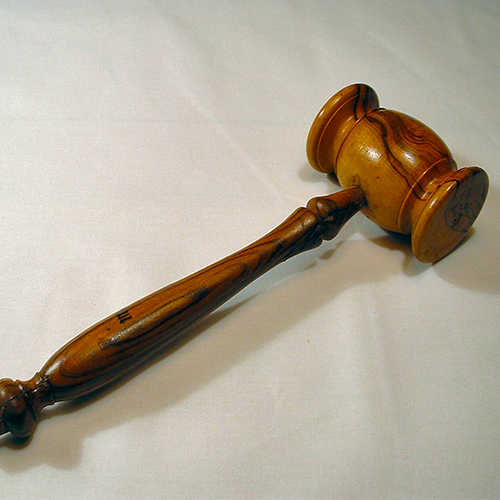Heffernan v City of Paterson: SCOTUS Examines Employee Rights under the First Amendment

Heffernan v City of Patterson
In Heffernan v.City of Patterson, the U.S. Supreme Court held that when an employer demotes an employee out of a desire to prevent the worker from engaging in protected political activity, the employee is entitled to challenge that unlawful action under the First Amendment and 42 U.S.C. § 1983, even if the employer’s actions are based on a factual mistake about the employee’s behavior.
The Facts of Heffernan v City of Paterson
Jeffrey Heffernan, a police officer in Paterson, New Jersey, was observed obtaining a local mayoral candidate’s campaign sign. Despite his claims that he was picking up the sign for his sick mother, Heffernan was demoted for his “overt[] involvement in a political election.” Heffernan filed suit under 42 U.S.C. § 1983 against the City of Paterson and several government officials. The suit alleged claims for (1) retaliatory demotion based on Heffernan’s exercise of the right to freedom of speech, and (2) retaliatory demotion based on his exercise of the right to freedom of association.
Ultimately, the district court dismissed the claims, concluding that Heffernan had not been deprived of any constitutionally protected right because he had not engaged in any First Amendment conduct. The Third Circuit Court of Appeals affirmed.
The Majority Decision in Heffernan v City of Paterson
The Supreme Court reversed by a vote of 6-2. Justice Stephen Breyer wrote on behalf of the majority.
In reaching its decision, the majority focused on the employer’s motive and the facts as it reasonably understood them (even if incorrect). It also assumed that the activities that Heffernan’s supervisors mistakenly thought he had engaged in are of a kind that they cannot constitutionally prohibit or punish.
The majority specifically cited its decision in Waters v. Churchill, 511 U. S. 661, where a government employer’s adverse action was based on a mistaken belief that an employee had not engaged in protected speech. In that case, the Supreme Court determined that the employer’s motive, and particularly the facts as the employer reasonably understood them, mattered in determining that the employer had not violated the First Amendment.
As Justice Breyer explained:
The government’s motive likewise matters here, where respondents demoted Heffernan on the mistaken belief that he had engaged in protected speech. A rule of law finding liability in these circumstances tracks the First Amendment’s language, which focuses upon the Government’s activity.
The Court also addressed the practical result of imposing liability. Justice Breyer wrote:
Moreover, the constitutional harm— discouraging employees from engaging in protected speech or association—is the same whether or not the employer’s action rests upon a factual mistake. Finally, a rule of law imposing liability despite the employer’s factual mistake is not likely to impose significant extra costs upon the employer, for the employee bears the burden of proving an improper employer motive.
The Dissent in Heffernan v City of Paterson
Justice Clarence Thomas authored a dissenting opinion, in which Justice Samuel Alito joined. The dissenting justices maintained that Heffernan’s Section 1983 claim must fail because he could not establish that his employer actually interfered with his Constitutional rights.
“The city’s attempt never ripened into an actual violation of Heffernan’s constitutional rights because, unbeknownst to the city, Heffernan did not support Spagnola’s campaign,” Thomas stated.
Previous Articles
SCOTUS Wraps Up Oral Arguments for the Term
by DONALD SCARINCI on May 17, 2022
The U.S. Supreme Court has concluded its oral arguments for the October 2021 Term. The justices hea...
SCOTUS Rules Censure of Elected Board Member Didn’t Violate First Amendment
by DONALD SCARINCI on May 10, 2022
In Houston Community College System v. Wilson, 595 U.S. ____ (2022), the U.S. Supreme Court held th...
Supreme Court Breach Is Not the First Involving Roe v. Wade
by DONALD SCARINCI on
The recent disclosure of Justice Samuel Alito’s decision purporting to overturn Roe v. Wade is ar...
The Amendments
-
Amendment1
- Establishment ClauseFree Exercise Clause
- Freedom of Speech
- Freedoms of Press
- Freedom of Assembly, and Petitition
-
Amendment2
- The Right to Bear Arms
-
Amendment4
- Unreasonable Searches and Seizures
-
Amendment5
- Due Process
- Eminent Domain
- Rights of Criminal Defendants
Preamble to the Bill of Rights
Congress of the United States begun and held at the City of New-York, on Wednesday the fourth of March, one thousand seven hundred and eighty nine.
THE Conventions of a number of the States, having at the time of their adopting the Constitution, expressed a desire, in order to prevent misconstruction or abuse of its powers, that further declaratory and restrictive clauses should be added: And as extending the ground of public confidence in the Government, will best ensure the beneficent ends of its institution.




